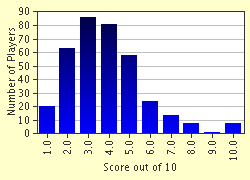Quiz Answer Key and Fun Facts
1. Why did the Bolshevists storm the Winter Palace in the October Revolution of 1917?
2. The European colonial powers tried to justify the "Scramble for Africa" (c. 1880-1895) by using the slogan "Manifest Destiny".
3. In 1934, following the death of Hindenburg, all members of the German armed forces had to swear an oath of allegiance to Hitler. There was something very odd about the oath. What was it?
4. When was the Church of England founded?
5. Which of these ghettos, liberated by Napoleon, was reimposed after 1814?
6. In 1420 Henry V conquered Paris in the Hundred Years' War. The next foreign monarch to enter the city as a conqueror was Tsar Alexander I in 1814.
7. This large island was settled by the Ancient Greeks, became part of the Roman Empire, passed to Byzantium but was then ruled by the Arabs from about 727-1061, when it was conquered by the Normans. Which of these is it?
8. Who *first* said: "Property is theft"? (Pause and take a deep breath before you answer).
9. Which of these European cities saw *two* major major uprisings (commemorated internationally) while under Nazi occupation?
10. When did the Allies conclude a peace treaty (or equivalent) with Germany after WWII?
Source: Author
bloomsby
This quiz was reviewed by FunTrivia editor
trammgr before going online.
Any errors found in FunTrivia content are routinely corrected through our feedback system.


